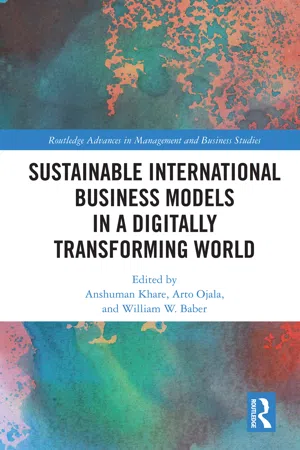1.0 Introduction
Research regarding digitalisation and its impact on companies’ international operations has recently generated growing interest. Digitalisation provides opportunities to bring new types of innovations to international markets (Nambisan, 2017; Parker et al., 2016; Yoo, 2012), and digital services provide new ways for companies to expand and globalise their offerings (Pettersen & Colbjørnsen, 2019; Plakoyiannaki et al., 2014). Consequently, digitalisation and digital services are seen as phenomena that will radically change the way in which companies enter international markets and how we conceptualise the ‘internationalisation’ of business (cf. Coviello et al., 2017; Knight & Liesch, 2016; Ojala et al., 2018).
While digitalisation and digital services are commonly perceived as topics relating to information systems (IS), companies’ international operations are usually studied by international business (IB) scholars. However, the internationalisation of digital services links these two fields and connects IB and IS studies. Studies regarding IS can help us to better understand how and why digital services can help companies to enter, and be more competitive in, international markets, whereas IB studies provide insights into how and why companies internationalise their operations. For instance, digitalisation might provide new international business opportunities where ‘the nature of offering, the distribution channels, the pricing strategy, may differ fundamentally’ from that of traditional companies (Coviello et al., 2017, p. 1152). As a result, digitalisation in general, and the emergence of digital platforms in particular, are revolutionising the way in which companies enter global markets and operate internationally.
The importance of this topic is well illustrated by the fact that digital platform providers have dominated global markets for years. For instance, the world’s four most valuable brands belong to companies (Apple, Google, Amazon and Microsoft) that provide digital platforms and related innovations globally (USA Today, 2018). In addition, there is a growing number of smaller companies entering the digital business world – either by providing their own digital platforms or digital content and services for established platforms (Knight & Liesch, 2016). Therefore, this study links the fields of IB and IS, meaning it can draw from and advance knowledge in both disciplines. As an emerging research topic, this literature review will enhance our understanding of the relationship between digitalisation, digital services and the internationalisation of companies.
Based on this discussion, we have reviewed the existing academic literature regarding digitalisation in the context of companies’ internationalisation. Because our general aim is to advance knowledge of this emerging area and provide guidance for further studies, we aimed to address the following three research questions: (1) What are the main themes connecting digitalisation, digital services and IB? (2) What is the role of digital services in companies’ international operations? (3) How can the phenomenon be studied in the future to better understand the interactions between digital services and internationalisation?
2.0 Scope and analytical approach of the review
To identify the studies for our review, we applied a systematic literature review based on guidelines introduced by Tranfield et al. (2003) and Webster and Watson (2002). We started the process by identifying the most relevant keywords. Because digitalisation in the context of companies’ internationalisation is a relatively new and multidisciplinary topic, we chose not to limit our literature search to specific journals or scientific fields. Ultimately, we ended up with a wide range of results from several databases, which minimised the risk of omitting any relevant publications.
To locate the relevant studies, we used keyword combinations related to internationalisation, such as ‘Internationalisation’ and ‘Foreign market’, with keywords related to digitalisation, such as ‘Digitalisation’, ‘Digitisation’ and ‘Digital’. Our search included titles, abstracts, keywords and full texts. The databases used were ScienceDirect, IEEE Xplore, ProQuest, EBSCO, Emerald and Wiley. These databases include the main publications from IB and IS fields. We included only academic peer-reviewed journal articles in our review. Similar to other reviews, studies appearing in non-English publication outlets were omitted.
The literature search was conducted during February 2021 and resulted in 578 hits. However, we found that most of the papers were actually related to either digitalisation or internationalisation and that these topics were rarely connected. Furthermore, we found many duplications between the various databases used. After removing the duplications and papers that were outside the scope of the review, we ended up with 41 relevant articles. Most of the papers were published between 2014 and 2021 (with one being published in 2003 and another in 2011), indicating the newness of the topic. The articles were published across a diverse range of management and business journals. Six of the papers were published in the Journal of International Business Studies and seven in Technology Innovation Management Review (this had a special issue covering this topic). The remaining articles were evenly divided between the remaining journals. Table 1.1 provides an overview of the bibliographic sources.
We used them...
